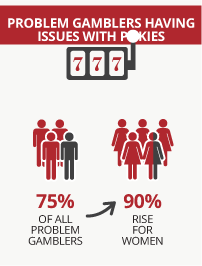Problem Gambling Issues In Australia
There are 3 main reasons for that: Gambling is not considered a profession, it's treated as a hobby or recreational activity. The Australian government views gains from gambling activities not as income, but as a result of good luck. The government taxes gambling operators instead. This research found that in 2014-15, the cost of problem gambling in Australia totalled $7 billion: $2.2 billion – family and relationship problems $1.6 billion – emotional and psychological issues, including distress, depression, suicide and violence. A 2017 research report found 70% of Victorians gamble, 0.8% are problem gamblers and 2.8% are at moderate risk of becoming problem gamblers. For some a gambling addiction stems from the need for. This broader conceptualisation of gambling-related harm is consistent with the Australian definition of problem gambling which states “problem gambling is characterised by difficulties in limiting money and/or time spent on gambling which leads to adverse consequences for the gambler, others, or for the communities” (Neal, Delfabbro and O'Neil 2005). Looking for help or support with problem gambling? You can get counselling, information & support 24/7 online at www.gamblinghelponline.org.au or by phone 1800 858 858.
A new study by researchers at Phoenix Australia has found that gambling is a significant and unrecognised problem among Australia’s military personnel. The study of 1324 Australian Defence Force (ADF) personnel shortly following operational deployment to the Middle East showed that almost eight per cent reported gambling problems, which was higher than levels of harmful drinking. The study highlights the need for increased awareness of these issues in military organisations and mental health services, and greater capacity of gamblers help services to respond appropriately to military personnel and veterans.

This is the first study of gambling problems in contemporary Australian veterans after deployment. While there are studies emanating from the US, and previous Australian studies have looked at gambling problems amongst Vietnam-era veterans, an increased understanding of the particular issues that exist for contemporary ADF members is needed.
While the study found the rate of gambling problems to be almost eight per cent, it also found that amongst males aged 18 to 24 years the level was significantly higher at 13 per cent.


Gambling and posttraumatic mental health problems
Problem Gambling Issues In Australia Today
The study also suggested an important link between gambling problems and trauma. Lead researcher, Dr Sean Cowlishaw says, “It is evident from our research that gambling problems should be recognised as a posttraumatic mental health problem, and considered routinely alongside other common issues including posttraumatic stress disorder (PTSD) and alcohol use problems. We found that 40 per cent of ADF personnel who reported problem gambling also suffered from PTSD.” Sean adds
“What we think is occurring is that some of these members have been exposed to trauma – potentially whilst on deployment – causing considerable psychological stress, and as a result, they turn to gambling as a form of self-medication.”
One question the research raises is why gambling problems might be more prevalent than alcohol misuse amongst contemporary ADF personnel, when compared to older veterans such as those who served in Vietnam.
Sean surmises that gambling has become increasingly accessible and pervasive in Australian society through, for example, betting apps and an abundance of electronic gaming machines, alongside high levels of gambling advertising on TV and in sports. He adds, “In the work environment, gambling may be less detrimental to productivity and may be ignored by employers, which is less the case with problematic alcohol use”.
The research team also found a link with a range of post-deployment adjustment problems. While it is not uncommon for personnel to experience some difficulty reintegrating into the community when they return from overseas deployment, members with a gambling problem were three times as likely to have adjustment difficulties.
The need for greater awareness
The research findings highlight the need for mental health services, within the ADF and in the broader community, to be vigilant for gambling problems in this group. Screening following deployment could be beneficial in picking up the problem at an early stage. Effective responses to gambling problems must also be available, either within mental health services or by referring on to specialist gamblers help services.
Sean’s advice to gamblers help services is to “provide training to staff to help them understand military culture. This factor is central to developing a positive, trusting relationship between the provider and the military veteran”.
“Given that in Australian society gambling has become quite ubiquitous, and that the impacts on the individual and their relationships can be severe, we need to improve our recognition of and response to this problem,” Sean says.
Problem Gambling Issues In Australia Right Now
“Further research is needed to help to improve initiatives to reduce the harm of gambling within the Australian military.”
Gambling Problems In Australia
The study was funded by the Victorian Responsible Gambling Foundation, and involved data provided by the Australian Government Department of Defence.